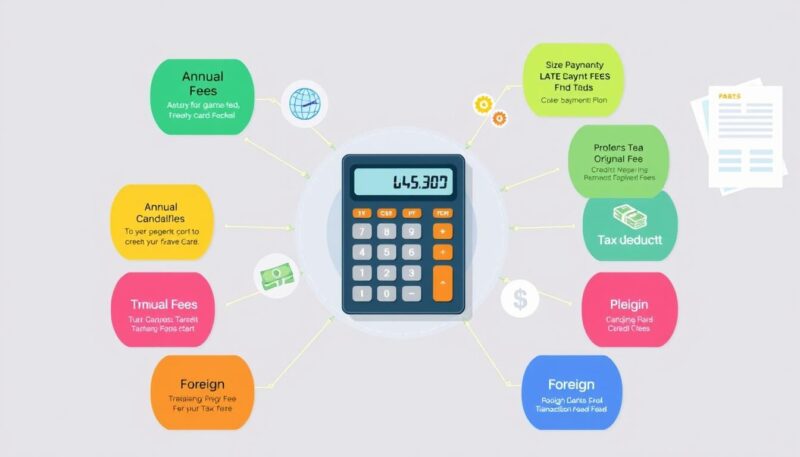Understanding the complexities of credit card fees and their tax implications can be a daunting task for many individuals and business owners. You may find yourself asking, “Are credit card fees tax deductible?” It’s a significant question, especially when it comes to ensuring you maximize your tax savings.
This article aims to clarify the nuance between personal and business credit card fee deductions, helping you navigate the often murky waters of tax regulations.
Most personal credit card fees, such as annual fees, foreign transaction fees, and late payment charges, typically do not qualify for credit card fee tax deductions. On the flip side, businesses can generally claim deductions for fees deemed “ordinary” and “necessary” under IRS guidelines.
By understanding deductible credit card fees clearly, you are equipped to manage your finances better and make informed decisions.
As we delve deeper into the specifics, you’ll discover what types of fees can be deducted for your business and why maintaining the separation of personal and business expenditures is crucial.
Whether you run a small business or simply keep a credit card for personal use, comprehending these differences could result in substantial tax savings. Let’s unravel this important topic together.
Introduction to Credit Card Fees
Credit card fees encompass a range of charges that arise when using these financial tools, which can impact your overall financial strategy. By gaining insight into the different types of credit card fees, you can improve your financial decision-making and enhance understanding credit card expenses. Common fees to be aware of include:
- Annual fees
- Balance transfer fees
- Late payment fees
- Foreign transaction fees
Each of these types of credit card fees serves a specific purpose and can contribute to the total cost of using a credit card. For instance, annual fees could provide benefits such as rewards or cashback but may not be worthwhile for infrequent users.
Understanding credit card expenses is crucial for both consumers and businesses. Many users may discover that they can avoid certain fees through better management practices.
By analyzing your spending habits and identifying areas for improvement, you can reduce unnecessary costs and make more informed choices about credit card usage. This proactive approach not only helps you save money but also enhances your overall financial health.
| Type of Fee | Typical Amount | Possible Waivers |
|---|---|---|
| Annual Fee | $0 – $550 | Spending thresholds, loyalty |
| Balance Transfer Fee | 3% – 5% of transfer amount | Promotional offers |
| Late Payment Fee | $25 – $40 | First-time waivers |
| Foreign Transaction Fee | 1% – 3% | No foreign fees card |
By familiarizing yourself with these aspects of credit card fees, you can take charge of your financial situation and work toward minimizing unnecessary expenses.
Understanding Deductible Credit Card Fees
Identifying which credit card fees are deductible is crucial for optimizing your tax return. In the realm of business expenses, the IRS requires that certain fees be categorized as “ordinary” and “necessary” to qualify for deductions. This means you must understand what qualifies under these terms to benefit from tax deduction eligibility.
Business credit card fees can be fully deductible if the card’s use is strictly for business-related expenses. If you charge personal expenses, only the proportion that applies to business use can be deducted. For instance, if 75% of your card charges are for business purposes, you’ll be able to deduct 75% of the annual fee.
Annual fees associated with business credit cards vary widely, ranging from zero to several hundred dollars. Premium cards may offer enticing rewards such as larger sign-up bonuses and valuable perks, but you should weigh these benefits against the annual fee to determine if they’re aligned with your spending patterns.
Transaction fees incurred through a payment processor are generally tax deductible. Ensuring accurate records of these fees can lead to significant tax savings. As you navigate your deductible credit card fees, keeping your business and personal finances distinct aids in precise tracking and enhances your ability to claim deductions correctly.
| Type of Fee | Tax Deductible? | Notes |
|---|---|---|
| Annual Fees | Yes, if used for business | Deductible proportionate to business use |
| Late Fees | Yes | Must be tied directly to business expenses |
| Balance Transfer Fees | Yes | Considered necessary for managing business credit |
| Transaction/Processing Fees | Yes | Directly related to business operations |
| Personal Credit Card Fees | No | Cannot deduct personal expenses |
Are Credit Card Fees Tax Deductible for Individuals?
When considering the potential for tax deductions, individuals should be aware that the landscape for personal credit card use is quite restrictive. Many believe that credit card fees can provide tax relief, but the reality often falls short of these expectations.
Personal credit card fees are typically classified as non-deductible fees when filing taxes, which significantly limits an individual’s ability to benefit from such charges.
Personal Credit Card Use and Tax Deductions
Your personal credit card use generally does not qualify for tax deductions. Fees associated with personal credit cards, such as annual fees and late payment charges, will not contribute to tax savings.
This misunderstanding can lead to confusion among cardholders who assume that common fees could somehow reduce their tax burden. Recognizing that are credit card fees tax deductible for individuals is crucial to avoid disappointment at tax time.
Common Non-Deductible Personal Fees
Several fees associated with personal credit cards are not eligible for deduction. Some of the most common non-deductible fees include:
- Annual fees
- Late payment fees
- Cash advance fees
- Foreign transaction fees
- Finance charges
Understanding these non-deductible fees can help you manage your finances better. By being aware that personal credit card fees are largely non-deductible, you can focus on maximizing other potential deductions associated with legitimate business expenses if you utilize a business credit card instead.
| Fee Type | Deductibility Status |
|---|---|
| Annual Fees | Non-Deductible |
| Late Payment Fees | Non-Deductible |
| Cash Advance Fees | Non-Deductible |
| Foreign Transaction Fees | Non-Deductible |
| Finance Charges | Non-Deductible |
Which Credit Card Fees Can Be Deducted for Businesses?
Understanding which credit card fees are deductible can have a significant impact on your business’s overall tax liability. The Internal Revenue Service (IRS) allows businesses to deduct certain fees related to business credit card expenses, provided they qualify as ordinary and necessary expenses.
Familiarizing yourself with what constitutes deductible business credit card fees will empower you to make informed financial decisions.
Ordinary and Necessary Business Expenses
The IRS defines ordinary expenses as those that are common and accepted in your trade or business, while necessary expenses are helpful and appropriate for your business activities. When it comes to business credit card fees, these may include but are not limited to:
- Annual fees
- Interest charges
- Late payment fees
- Over-limit fees
- Foreign transaction fees
- Merchant service fees
- Replacement card fees
Types of Deductible Business Credit Card Fees
As a business owner, it’s crucial to track specific types of expenses to ensure that you are capitalizing on every deductible opportunity. The following categories outline relevant business credit card fees that can be deducted:
| Fee Type | Description | Deductibility |
|---|---|---|
| Annual Fees | Charged yearly for maintaining the account. | Deductible |
| Interest Charges | Interest accrued on outstanding balances attributed to business expenses. | Deductible |
| Late Payment Fees | Fees incurred for missed payment deadlines. | Deductible |
| Merchant Fees | Costs charged by processors for accepting credit cards. | Deductible |
| Foreign Transaction Fees | Fees applied when conducting transactions in a foreign currency. | Deductible |
| Replacement Card Fees | Fees charged for issuing a new card. | Deductible |

Maintaining clear records of your business credit card fees will help ensure that you accurately account for any deductions, ultimately contributing to more effective financial management.
Automating your documentation, such as using software for organizing receipts and statements, can enhance this process. Make it a priority to separate personal and business transactions to avoid complications during tax preparation.
Guidelines for Deducting Business Credit Card Fees
When it comes to deducting business credit card fees, maintaining clear separations of expenses is essential. Distinguishing personal expenses from business-related charges can significantly simplify your deduction process and reduce potential complications.
Utilizing dedicated credit cards exclusively for business transactions provides a sound foundation for this separation. This practice not only ensures compliance but also helps in tracking deductible expenses accurately.
Separation of Personal and Business Expenses
To maximize your deductions, commit to using business credit cards for all related purchases. This approach minimizes the risk of mixing personal and business expenses, which the IRS scrutinizes closely. Employing separate accounts also clarifies which fees are eligible for deductions.
Ensure that your documentation for deductions includes clear records of all business transactions. Maintaining a meticulous ledger that tracks when and where each expense occurred can further bolster your claims. Keep in mind that personal expenses often dilute the effectiveness of your business deductions.
Documentation and Record Keeping
Accurate and thorough documentation for deductions plays a pivotal role in successfully claiming business credit card fees. Invoices, receipts, and bank statements should be organized and easily accessible for tax preparation.
Be aware that maintaining detailed records of your expenses allows you to substantiate your claims should the IRS require backup documentation. Familiarize yourself with the type of documentation needed, which typically includes:
- Receipts for any credit card processing fees.
- Annual and monthly fees charged by the credit card issuer.
- Documentation proving the business purpose of each expense.
Engaging a tax professional for advice on your documentation practices can ensure compliance with ever-evolving tax laws. Special attention may be needed for interest accrued on business purchases, as this may be deductible too—provided it meets the necessary criteria.
Overall, effective record-keeping not only simplifies the deduction claim but also enhances the potential tax savings you can achieve through deducting business credit card fees.
| Expense Type | Deductible (Yes/No) | Notes |
|---|---|---|
| Credit Card Processing Fees | Yes | Considered a business expense |
| Annual Fees | Yes | If associated with business credit card |
| Interest on Business Purchases | Yes | Only for qualifying business expenses |
| Late Fees | Yes | If incurred on business-related transactions |
| Personal Credit Card Fees | No | Cannot be deducted |
Tax Rules on Credit Card Fees
Navigating the tax rules on credit card fees is crucial for business owners who frequently engage in credit card transactions. The IRS guidelines provide clarity on what fees are deductible, making it essential to understand the different types of processing fees involved in these transactions.
IRS Guidelines on Credit Card Fees
The IRS considers merchant fees—commonly known as credit card fees—as necessary operating costs for businesses. This classification allows for significant tax benefits.
For sole proprietorships and LLCs filing as sole proprietorships, credit card processing fees can be reported as deductible expenses on Schedule C of Form 1040. This includes annual fees associated with business credit cards, as long as the card is utilized exclusively for business transactions.
Payment processors are required to send Form 1099-K, which details all fees charged in the previous year by January 31st. This form serves as a vital resource when calculating eligible deductions. It’s important to maintain organized records of transactions to accurately substantiate these deductions.
Properly separating personal and business expenses is crucial for ensuring only qualified expenses are claimed.
Understanding Processing Fees and Tax Implications
Processing fees can vary widely based on the payment processor. For instance, using Pay1040, paying with a credit card incurs a fee of 1.75% of the payment amount with a minimum fee of $2.50, while ACI Payments, Inc. charges 1.85% with a minimum of $2.50. For a $50 payment, both processors impose the same minimum credit fee.
However, these processing fees are deductible as part of business expenses, thus lowering taxable income.
Interchange fees, which are often non-negotiable, represent a significant portion of the total costs incurred when accepting card payments. Assessment fees, although also typically non-negotiable, tend to form a smaller percentage of the total fees.
Meanwhile, processor markup fees can vary significantly and are subject to negotiation.
Ultimately, understanding processing fees deductions is key to maximizing tax savings.
The IRS Publication 535 provides detailed insights into business expenses and deductions, helping businesses adapt to changes in tax laws. Staying informed and consulting tax professionals can further enhance opportunities for minimizing tax liabilities.

| Payment Method | Processor | Fee Structure |
|---|---|---|
| Debit Card | Pay1040 | $2.15 per transaction |
| Credit Card | Pay1040 | 1.75% + $2.50 minimum |
| Debit Card | ACI Payments, Inc. | $2.10 per transaction |
| Credit Card | ACI Payments, Inc. | 1.85% + $2.50 minimum |
Common Mistakes When Claiming Tax Deductions
Business owners commonly face challenges that can hinder their ability to maximize tax deductions for credit card fees. Recognizing pitfalls, especially related to mixing personal and business expenses, is crucial for smoother tax reporting. Inaccuracies in reporting can complicate things further and lead to unfavorable outcomes.
Mixing Personal and Business Charges
Mixing personal and business expenses is a frequent issue that can lead to common mistakes in tax deductions. Clearly separating your finances is essential.
Blurring these lines can result in non-deductible charges or discrepancies that raise red flags during audits. Implementing dedicated payment methods for business transactions streamlines the process and ensures you capture eligible expenses without confusion.
Accurate Reporting of Income After Deductions
Accurate reporting plays a vital role in successful tax filing. After claiming deductions, it is crucial to document the remaining income correctly. Failure to provide precise information may trigger penalties or delays in processing. This diligence not only helps avoid unnecessary fines but also reinforces the credibility of your financial reporting.
Conclusion
Understanding credit card fees and their tax implications is crucial for both individuals and businesses. As we explored, individuals face limited opportunities for tax deductions, primarily restricted to ordinary expenses that impact tax determination.
On the other hand, businesses can leverage various deductible expenses related to credit card fees, translating into significant savings. This tax deductions overview highlights the diverse ways deductions can optimize your financial position.
Particularly for those making electronic tax payments, it’s important to note the average convenience fee sits at about 2.5%. However, under current IRS regulations, these fees are considered non-deductible personal expenses.
This nuance underscores the necessity of understanding credit card deductions and their specific qualifications, ensuring you remain compliant while maximizing potential benefits.
In your journey to manage credit card expenses effectively, recognizing the regulations and keeping thorough records are essential. This not only protects your financial health but also empowers you to make informed decisions about your credit card usage and tax liability.
Keep these final thoughts on credit card fees in mind as you navigate the complexities of tax filings and maximize your savings opportunities.

